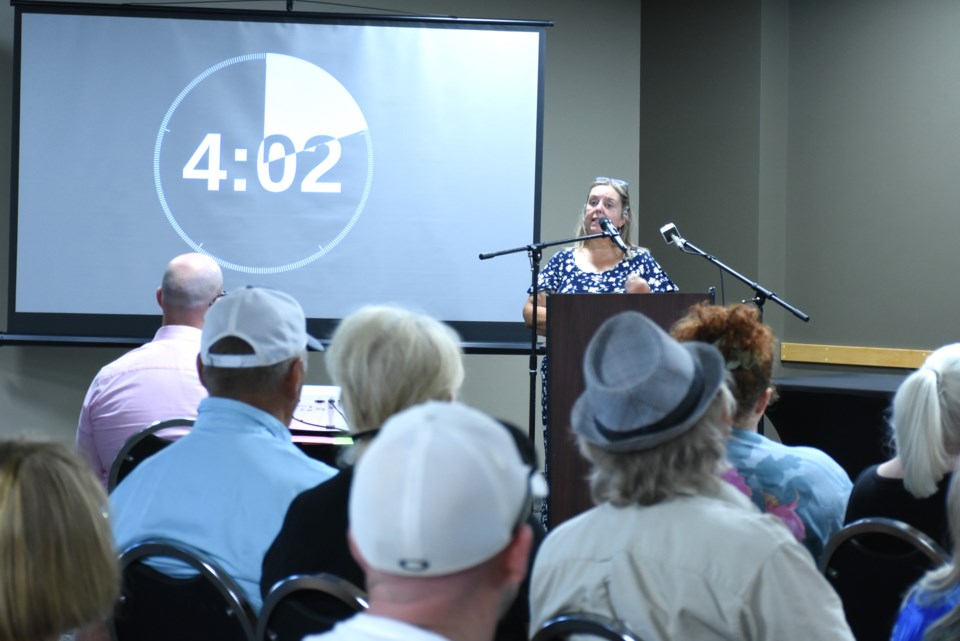MOOSE JAW — A packed room, civil discourse, and perhaps unexpected decorum marked the public safety meeting held at the Moose Jaw Events Centre on July 29.
After a petition to discuss the location of the planned Souls Harbour Rescue Mission failed to get the required minimum number of signatures earlier, city council was convinced of the need for a public discussion to address homeless shelters in general, along with addiction services and safety concerns in downtown Moose Jaw.
Beginning at 6 p.m., 41 registered speakers — with a few absentees — were allotted five minutes each to speak their mind on any relevant topic of their choosing. These topics ranged from downtown safety issues to personal experiences and an exploration of the root causes of the problem.
Defining the problem
“We care about our city’s future, otherwise we wouldn’t be here,” announced Patty Yuzek, who was the thirteenth speaker on July 29. “The fact is that people care. They care about finding solutions to our current problem.”
Whether each speaker agreed or disagreed with the shelter’s location, a seemingly unanimous position viewed Moose Jaw’s homeless issue as being largely a mental health and addictions issue.
“I’ve said before, I don’t believe our city has a homeless problem; we have an addiction problem," she added.
Donna Boyer, who works with Journey to Hope, pointed out that many problematic behaviours — unintentionally alluding to earlier experiences shared by Sandra Nickson and Cynthia Watson in downtown Moose Jaw — are largely caused by a person living in survival mode.
“Our human survival needs are food, water, clothing, sleep, and shelter,” Boyer said, referencing the Canadian Observatory on Homelessness. Many who commit risky behaviours are doing so out of survival — a position which was backed by other speakers including Megan Jasper, who was once addicted and homeless but is now seven years clean.
“I was that girl,” she said. “I was that girl that went through your garbage, went through your back alley, and I was also the girl that broke into your car. I didn’t do those things to hurt you.
“I did those things because I didn’t have a place to sleep and my stomach was hungry.”
Jasper believes the proposed downtown shelter can help provide a solution the core reasons for these behaviours.
“So, if you want to take people like me and segregate us and throw us outside of town… far from our core support system, (success) stories like mine won’t happen,” she said.
A few things to consider
Connie Conrad and her family have lived in Moose Jaw for over 20 years and helped donate around half a million dollars to the Riverside Mission. She said she’s in support of the shelter’s downtown location and gave a few suggestions for the audience to think about.
Imagine if there’s no Riverside Mission, she said in her example, and winter is coming.
“Homeless people may be sleeping in doorways, under cardboard boxes, on park benches, or in garbage bins,” she said. “This may result in increased visits to emergency at the hospital due to illnesses from living rough.”
She said there would also be tent encampments in Crescent Park and down in the Wakamow Valley, where folks would be “living in unsafe conditions with the risk of fires.”
“We have seen these encampments in Victoria Park in Regina, and in other cities as well,” she added.
“Now imagine the second scenario: There’s a new (mission) and a safe place with a warm bath, hot meals, a laundry facility, a caring hand, and a listening ear,” she continued. “What scenario would we like for Moose Jaw?”
Her statement was reinforced by Maxton Eckstein, who — based on around 10 years of experience as team lead for a Regina-based homeless program — noted that people tend to stay close to the resources and social connections available to them.
Rom Jukes, who spoke after Eckstein, suggested everyone “avoid the very tempting, very human tendency to pick a side” on the matter, adding that “We are a community together.”
Crystal Peterson, who manages the Willow Lodge shelter, said the best indication of success is to have a strong support network.
The Willow Lodge, she said, has provided a warm bed 1,934 times, served over 3,000 meals, and has created “countless non-judgmental relationships.”
“Our guests are much like you and I,” she said. “They are our neighbours, our parents, our classmates, and our coworkers. Noone ever chooses this path.
“Sometimes we are born into it. Sometimes it’s a slow spiral. And sometimes we are just one missed paycheck away,” she continued. “Every person that stays in our shelter has a story.
“If we don’t have people in our lives that support us, love us, and wholeheartedly want the best for us, none of us would succeed,” she said.
The public safety meeting concluded after approximately four hours. Although insightful, the meeting was not a city council meeting which means no motions, debates, or decisions were made by city council, who was in attendance during the meeting.
This article is part of a three-part series that looks into some of the issues brought up during the public safety meeting on July 29.




